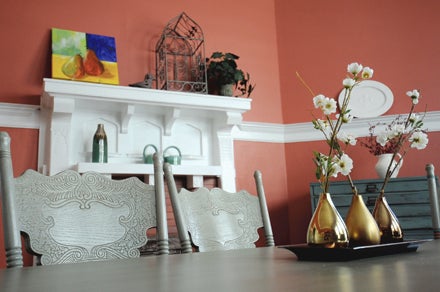Thinking about selling a house? Start here
Published 6:46 pm Thursday, January 7, 2016

SMART SELLERS: A smart home seller recognizes that first impressions count and will take care of any unsightly problems with the yard or house before putting it on the market.
The holidays are over. Most have packed the Christmas decorations safely back in the attic and are slowly getting back to regularly scheduled life. The year yawns ahead — especially for those who are thinking about selling their homes. Those people are looking forward to a list of chores both large and small.
While the real estate market in Beaufort County took a huge hit during the recession and has yet to rebound in the eight years since, local real estate agents are hopeful for 2016. Though prices aren’t appreciably rising, there has been a surge in sales, according to Mariah Wilson, co-owner of Coldwell Banker Coastal Rivers Realty in Washington.

DAILY NEWS
FIRST IMPRESSIONS: While potential homebuyers are waiting for a real estate agent to unlock the door, they’re taking a good look around them. The appearance of a front door and its environs are very important to making a good impression that just might sway a sale.
“We’re getting rid of a lot of our old inventory. Things are starting to sell. Demand has increased and pricing has come down. It’s very affordable, and they’re still some great deals out there,” Wilson said.
Selling a house and preparing to a sell house are two different things, however, and it’s the season for the prep work. In a market that favors buyers over sellers, sellers need to be careful about how they present their homes. While a decision to buy a home is very much about getting a good deal for a well-kept property that fits the buyer’s specific space requirements, it’s just as much about the intangibles.
“Buying a house is emotional. People want to imagine that this will be their home and it strikes a very emotional chord in most people,” Wilson said.
She points out the real first impression comes at the most obvious place.
“The front door or the door where you enter most often — that’s where people get their first impression of the house,” Wilson said. “That might be the place they’re standing the longest because the realtor is opening the door.”

DAILY NEWS
IN THE DETAILS: Allowing buyers the opportunity to see details like original woodwork gives sellers a leg up on the competition.
Enhancing curb appeal is the way to guarantee a good first impression: mowing the lawn; edging the driveway; mulching or putting fresh pine straw into flower beds; making sure a front door is clean and painted — all combine to create a good first impression.
Once one gets in the door however, another factor comes into play, one that often prevents potential buyers from imagining themselves living in that particular home: stuff, and a lot of it.
“A lot of times it’s hard for a seller to understand that a buyer’s first impression is important,” Wilson said. “Even though they know in their head that the furniture doesn’t stay, the stuff doesn’t stay, it’s still that overall first impression that might be clouded by clutter and isn’t looking its best.”
Getting rid of the clutter is a concept with which Century 21 realtor Scott Campbell fully agrees.
“I’ve said it a thousand times: de-clutter,” Campbell laughed. “A buyer wants to look at your kitchen countertops, not your coffee maker.”
Personal items, furniture crowding a room, doorways blocked, family pictures, souvenirs, just the general collection of things amassed through living should be packed up and done away with, whether that’s to an extra room, attic, basement or storage facility. It may not seem like such a deal breaker from the perspective of the homeowner — because everyone loves their own stuff, Campbell said — but potential home buyers can be very affected by someone else’s clutter.
“They don’t know they’re reacting to it, but I see how they’re reacting to it; they’re looking at your stuff, not the house — looking at the pictures of the Paris vacation. Once that starts happening in a house, the buyer has disengaged. So put it away. You’re selling your house, not your stuff,” Campbell said.
Campbell said that work to prepare a house for sale basically falls into two categories: simple weekend projects and major repairs. Most “first impression” projects fall into the weekend project category — projects like de-cluttering.
“It’s zero cost, can actually be fun and you can do it at your own pace,” Campbell said.
Wilson encourages homeowners to enlist the help of friends when preparing a home for potential buyers and real estate agents to go tromping through. That extra set of eyes can help identify problem areas.
“I think it’s good to have someone who doesn’t live with them to come and look at it, whether it’s a realtor or a friend, to give that second opinion, that objective opinion. Most of us don’t see our own clutter,” Wilson said. “We all have dirty corners, and sometimes those things aren’t big things, but it gives the impression that the home hasn’t been taken care of.”

DAILY NEWS
SANS CLUTTER: Removing clutter from a home to be sold does not mean removing personality. De-cluttering is about removing the extra stuff that distracts a buyer from the house itself.
It also doesn’t hurt to take a few pictures of the interior and exterior of the home.
“Things you notice in the pictures are not things you see with the naked eye,” Wilson said. “When you take a picture, some things really stand out.”
Prepping a house for sale is not about entirely removing the homeowner’s personality, however. It’s simply about giving a potential buyer the ability to see the house itself. It may mean the difference between a few weeks on the market and a few years on the market.
“I can’t stress enough the difference it makes when a buyer walks into a house and it’s tidy, organized and de-cluttered,” Campbell said. “That’s the house they’re going to buy.”





